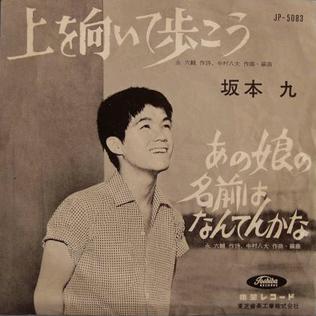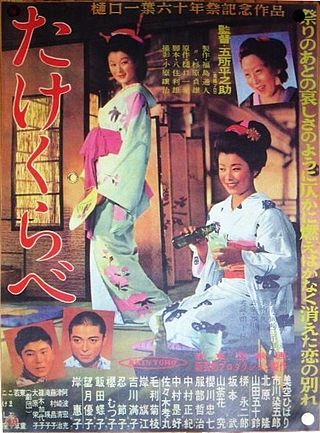
Kyu Sakamoto was a Japanese singer.

"Ue o Muite Arukō", alternatively titled "Sukiyaki", is a song by Japanese crooner Kyu Sakamoto, first released in Japan in 1961. The song topped the charts in a number of countries, including the U.S. Billboard Hot 100 in 1963.
Ryūkōka is a Japanese musical genre. The term originally denoted any kind of "popular music" in Japanese, and is the sinic reading of hayariuta, used for commercial music of Edo Period. Therefore, imayō, which was promoted by Emperor Go-Shirakawa in the Heian period, was a kind of ryūkōka. Today, however, ryūkōka refers specifically to Japanese popular music from the late 1920s through the early 1960s. Some of the roots of ryūkōka were developed from Western classical music. Ryūkōka ultimately split into two genres: enka and poppusu. Unlike enka, archetypal ryūkōka songs did not use the kobushi method of singing. Ryūkōka used legato. Bin Uehara and Yoshio Tabata are considered to be among the founders of the modern style of kobushi singing.

Manami Konishi, also known as KONI-TAN, is a Japanese actress, singer, songwriter, rapper, and record producer.

Sukiyaki and Other Japanese Hits is an album by Kyu Sakamoto released in 1963 in the U.S. by Capitol Records. All of the songs on the album are sung in Japanese and feature the title track, a #1 hit in the U.S. for three weeks in 1963, and peaking at #6 in the UK when issued by EMI on its HMV label. The 'b'-side, "Anoko No Namaewa Nantenkana", and a cover of "Good Timin'", a hit in 1960 for R&B singer Jimmy Jones, in both the US and the UK.
Hanako Oshima is a Japanese singer and the daughter of actress Yukiko Kashiwagi and singer Kyu Sakamoto.
Yukiko Kashiwagi is a Japanese actress and was the wife of Japanese singer Kyu Sakamoto from 1971 until his death in 1985. In the 1970s, Kashiwagi retired from her career as an actress and instead presented a series of welfare performances with her husband in children's homes and nursing homes, and on Japanese television.

Ue o Muite Arukō: Sakamoto Kyu Monogatari/Walking while Looking Up - The Kyu Sakamoto Story (上を向いて歩こう-坂本九物語) is a biography based on the Japanese singer Kyu Sakamoto's life. The movie was first broadcast on TV Tokyo on August 21, 2005 as a commemoration of the 20th anniversary of Sakamoto's death.

Kyu Sakamoto CD & DVD The Best is a Japanese album with 13 songs performed by Kyu Sakamoto and recorded by Toshiba EMI. A DVD with a live performance by Kyu Sakamoto also follows with the CD.

Shichiji ni aimashō (7時にあいまショー) was a Japanese musical variety television program broadcast by TBS from 7 p.m. to 7:30 p.m, from 7 April 1962 until 28 September 1963.

Rokusuke Ei was a Japanese lyricist, composer, author, essayist, and television personality of Chinese descent.

VOICE ~cover you with love~ is Tomiko Van's second solo album and her first cover album, released on March 28, 2007 by Avex Trax. The album comes in two different versions; a CD+DVD version and a CD only version. While "Coffee Rumba" is a Jose Manzo Perroni cover, the first recording of this song into Japanese was in 1961 by Sachiko Nishida; Van actually covered Yōsui Inoue's 2001 version. The song "TRUTH'94" had already been released by Van on TRF's single "Where to begin" in early 2006.
"Miagete goran yoru no hoshi wo" is a 1963 hit song performed by a Japanese singer Kyu Sakamoto. It was written by lyricist Rokusuke Ei and composer Taku Izumi. Izumi won the Japan Record Award. The song was originally written for a musical of the same title in 1960.
The MTV Video Music Awards Japan 2004 were hosted by entertainer and singer Tomomitsu Yamaguchi at Tokyo Bay NK Hall in Urayasu, Chiba.

Takekurabe is a 1955 Japanese drama film directed by Heinosuke Gosho. It is based on Higuchi Ichiyō's 1895-1896 novella Takekurabe.
Mariko Takahashi is a Japanese female singer. She is known for her ballad pop songs. She began her singing career in 1973 singing covers, but soon progressed to writing her own songs. She is also able to play piano and saxophone.
Seishiro Kato is a Japanese actor.
"Mameshiba" is the ninth single by Japanese singer Maaya Sakamoto. The lyrics for "Mameshiba" were written by Maaya Sakamoto herself while the lyrics for "Kuuki to Hoshi" were written by Yūho Iwasato. The music was composed and arranged by Yoko Kanno.
Tatsuya Yamaguchi is a Japanese former singer, television presenter, and bassist for the Johnny & Associates group Tokio.
The 5th Japan Record Award was held on December 27, 1963. Michiyo Azusa was the first female solo singer to win the JRA.
This page is based on this
Wikipedia article Text is available under the
CC BY-SA 4.0 license; additional terms may apply.
Images, videos and audio are available under their respective licenses.










